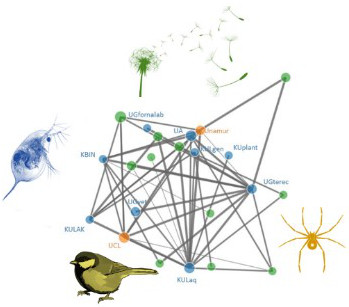| Home
| Program
- EVENET
- FAME
| Abstracts
- EVENET
- FAME
| Download
| Registration
| Venue
| Committees
|
EVENET Scope symposia
Timing
(K) : keynote talk (25 + 5 min)
(R) : regular talk (12 + 3 min)
(F) : flash talk (5 min + optional poster)
 | EVENET
program |
 | EVENET
abstracts |
Symposium 1: Spatial ecology & evolution
Tuesday 20 December 2016
| 9:10 h | Tom Miller (K) - Rapid evolution of dispersal modifies the ecological dynamics of biological invasion |
| 9:40 h | Emanuel Fronhofer (K) - The eco-evolutionary dynamics of range expansions |
| 10:10 h | Jacob Staffan (R) - Local adaptation despite gene flow through habitat choice |
| 10:25 h | Filip Huyghe (R) - Genetic connectivity of the skunk clown fish in the Indian Ocean using different types of markers |
| 10:40 h | An Vanden Broeck (F) - Gene flow and effective population sizes of the Alcon blue butterfly Maculinea alcon in a highly fragmented, anthropogenic landscape |
| 10:45 h | Hanne Decort (F) - Intra- and interspecific genetic composition of a meta-community: The Phengaris alcon system |
| 10:50 h | Nicolas Schtickzelle (F) - Movement variation matters for predicting dispersal of Tetrahymena ciliates |
| 15:55 h | Pierre-Alexandre Gagnaire (K) - Reconstructing the evolutionary history underlying the genomic landscape of species divergence using haplotype-resolved genomes |
| 16:25 h | Oliver Katz (R) - Costs and consequences of dispersal evolution in a ciliate model system |
| 16:40 h | Stefano Masier (F) - Conditional dispersal in response to food shortage and predator cues in an arachnid |
| 16:45 h | Filip Volckaert (F) - Seascape genetics of a top predator, European sea bass |
| 16:50 h | Josefin Sefbom (R) - A planktonic diatom displays genetic structure over small spatial scales |
Symposium 2: Evolution of/in metacommunities
Tuesday 20 December 2016
| 11:25 h | Jelena Pantel (K) - Intraspecific variation, environmental heterogeneity, and their influence on metapopulation dynamics in the freshwater snails of Guadeloupe< |
| 11:55 h | David Angeler (K) - Resilience and evolution: oxymoron or partnership? |
| 12:25 h | Lynn Govaert (R) - The evolution of the G-matrix: an example of Daphnia magna |
| 12:40 h | Miguel Lurgi (R) - Modelling the eco-evolutionary dynamics of meta-communities |
Wednesday 21 December 2016
| 13:50 h | Pedro-Perez Neto (K) - A conceptual and empirical framework for unifying trait ecology and community phylogenetics |
| 14:20 h | Mark Urban (K) - Eco-evolutionary resilience in the Anthropocene |
| 14:50 h | Hendrik Trekels (R) - Uncoupling habitat selection from species sorting in aquatic insect communities |
| 15:05 h | Adriana Alzate (R) - Effect of island size and dispersal on adaptation in a mainland-island system |
| 15:20 h | Rampal Etienne (R) - A dynamic model for phylogenetic community ecology - CANCELLED |
| 15:20 h | Laurens Kilsdonk (R) - Regime shifts in eco-evolutionary systems |
| 15:35 h | Jasmijn Hillaert (F) - The evolution of an optimal size distribution in food webs |
Symposium 3: Evolutionary ecology of stress responses
Tuesday 20 December 2016
| 14:10 h | Caroline Isaksson (K) - Adaptation or acclimation to urban anthropogenic stressors: A case study of the great tit |
| 14:40 h | Caroline Nieberding (R) - A learnt behavioural response to climate change may produce maladaptation |
| 14:55 h | Lin Op de Beeck (R) - Thermal adaptation and lowered pesticide accumulation counteract the negative effects of multiple pesticide applications under global warming |
| 15:10 h | Nedim Tüzün (F) - Pathways to mating success differ between urban and rural damselflies |
| 15:15 h | Lizanne Janssens (F) - Rapid evolution of increased vulnerability to an insecticide at the expansion front in a poleward-moving damselfly |
| 15:20 h | Thanh Tam Tran (F) - Evolution determines how warming and pesticides modulate predator–prey interactions with vector mosquitoes |
Wednesday 21 December 2016
| 16:10 h | Victor Nilsson-Örtman (K) - Seasonality, acclimation and biotic interactions under climate change |
| 16:40 h | Alison Duncan (K) - Host-parasite coevolution in variable temperature environments |
| 17:10 h | Julie Verheyen (R) - Thermal evolution shapes the ability of damselfly larvae to deal with increases in both mean temperature and daily temperature fluctuations |
| 17:25 h | Kristien Brans (R) - Urban Heat Islands: The evolution of thermal tolerance, life history, and physiological traits in response to urbanization in the water flea Daphnia magna |
| 17:40 h | Tom Pinceel (F) - Aridity promotes bet hedging via delayed hatching in two temporary pond crustaceans
along a latitudinal gradient |
Symposium 4: Host-microbiota (inclusive parasite) eco-evolutionary dynamics
Wednesday 21 December 2016
| 10:15 h | Lutz Beckx (K) - Eco-evolutionary dynamics and patterns of parallel evolution of host and virus populations |
| 10:45 h | Emilie Macke (R) - Life history and eco-evolutionary dynamics in light of the gut microbiota |
| 11:30 h | Anna-Liisa Laine (K) - How is diversity maintained in pathogen populations? |
| 12:00 h | Aurélie Tamsienski (R) - Phenotypic convergence and conservation of immune processes involved in the establishment of detoxifying symbiosis between coastal and hydrothermal annelid |
| 12:15 h | Eva Lievens (R) - Ecological and evolutionary factors drive the specialization of two microsporidian parasites of Artemia |
| 12:30 h | Willem Stock (F) - Diatom-bacteria interactions: from the field to the lab |
Symposium 5: On genomes
Wednesday 21 December 2016
| 9:00 h | De Wit (K) - Adaptation from standing genetic variation – the future of marine animals in a rapidly changing world? |
| 9:30 h | Dick Roelofs (K) - Coping with life in soil: comparative analysis of springtail genomes |
| 10:00 h | Till Czypionka (R) - Exploring the genetic underpinnings of diapause termination timing in Daphnia magna – an approach combining QTL mapping and candidate gene association studies in natural populations |
|



